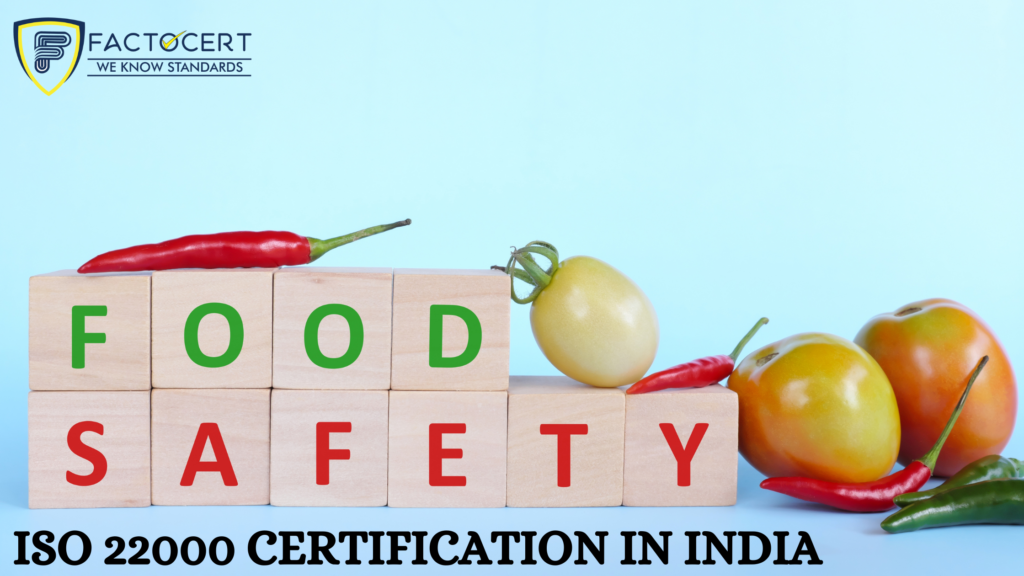Food Safety and Business Growth:
ISO 22000 Certification in India The Impact of ISO 22000 Certification on Indian SMEs. Introduction: In India’s bustling food market, food safety is a major priority. It’s tricky for small and medium businesses to keep up with food safety rules and remain competitive.
Yet, getting ISO 22000 Certification in India can change the game. Through this blog, we explore how ISO 22000 certification helps Indian SMEs build trust, boost operations, and unlocks growth opportunities.
Aligning with Global Standards:
ISO 22000 Certification in India benefits Indian SMEs by aligning them with international food safety standards. With this certification, companies can show their commitment to safe products, which strengthens their reputation and opens new business opportunities. These can contribute to their global growth.
Building Customer Trust:
Because of increased food safety awareness, customers prefer products with ISO 22000 Certification in India. They appreciate knowing their food suppliers follow strict safety measures. For businesses, this trust can mean loyal clients, an enhanced brand, and a bigger share of the market, setting them up for success in this competitive field.
Boosting Operational Efficiency:
ISO 22000 Certification in India doesn’t just deal with regulatory needs; it helps improve internal processes too. By applying this systematic approach to food safety, SMEs can smooth out operations, reduce risks, and lower associated costs. Every production step is carefully planned and monitored, making for smoother operations and more profit.
Encouraging Constant Improvements:
A central part of ISO 22000 Certification in India is regular improvement. Indian SMEs can promote a culture of excellence and innovation in food safety practices. Regular check-ups and feedback can reveal areas that need improvement. This commitment to high standards not only ensures ISO 22000 Certification in India compliance; it also motivates innovation, agility, and resilience, positioning SMEs for long-term success in the dynamic Indian food market.
Unlocking New Market Opportunities:
With ISO 22000 Certification in India, Indian SMEs gain access to markets with strict food safety standards, such as Europe and North America. This unlocks expansion and diversification opportunities, allowing SMEs to reach new customers beyond Indian borders. Plus, ISO 22000 can serve as a business differentiator, giving an edge in markets where food safety is paramount.
Ensuring Business Continuity in Crises:
In the age of global health crises like COVID-19, food safety is a key focus. ISO 22000 Certification in India gives SMEs the tools they need to handle unprecedented challenges while keeping their food products safe. The certification empowers SMEs to adapt and thrive, ensuring public health and business continuity.
Conclusion:
To conclude, ISO 22000 Certification in India is extremely valuable for Indian SMEs. It offers a path to improved food safety, customer trust, operational efficiency, and competitive market positioning. By pursuing ISO 22000 certification, SMEs can raise their global market standing, uncover new growth avenues, and play a part in the sustainable progress of India’s dynamic food industry. As the demand for safe and quality food increases, ISO 22000 certification becomes even more essential for SMEs aiming to flourish in India’s changing food landscape.
Why Factocert for ISO 22000 Certification in India
We provide the best ISO consultants Who are knowledgeable and provide the best solution. And to know how to get ISO certification. Kindly reach us at ISO Certification consultants work according to ISO standards and help organizations implement ISO certification in India with proper documentation.
For more information, visit ISO 22000 Certification in India.
Frequently Asked Questions
What is ISO Certification in India?
The ISO Certification in India stands for International Organization for Standardization. It plays an essential role in maintaining various market sectors’ standards. It starts right from manufacturing an item to providing a product. It is an independent, international organization that develops standards for ensuring the safety, quality, and efficiency of the services and products across India cities like Delhi, Mumbai, Bangalore, Chennai, Hyderabad
Who Needs ISO Certification in India?
For industries in India, ISO certification might be called for by legislation or contractually. But, even if that’s not the situation, satisfying ISO criteria has many advantages for organizations: Saving money and time by recognizing and resolving persisting issues, Improving system, and process effectiveness.
What are the types of ISO Certifications mandatory in India?
While all the ISO Standards are necessary for different organizations, some of the mandatory ISO Certification Standards in India are:
- ISO 9001 Certification: Quality Management System
- ISO 14001 Certification: Environmental Management System
- ISO 45001 Certification: Occupational Health and Safety
- ISO 27001 Certification: Information Security Management System
- ISO 22000 Certification: Food Safety Management System
What is the cost of ISO Certification In India?
Although the cost of ISO Certification in India depends on the type of ISO Standards, Factocert provides the best ISO Certification services at the most affordable price across India.





